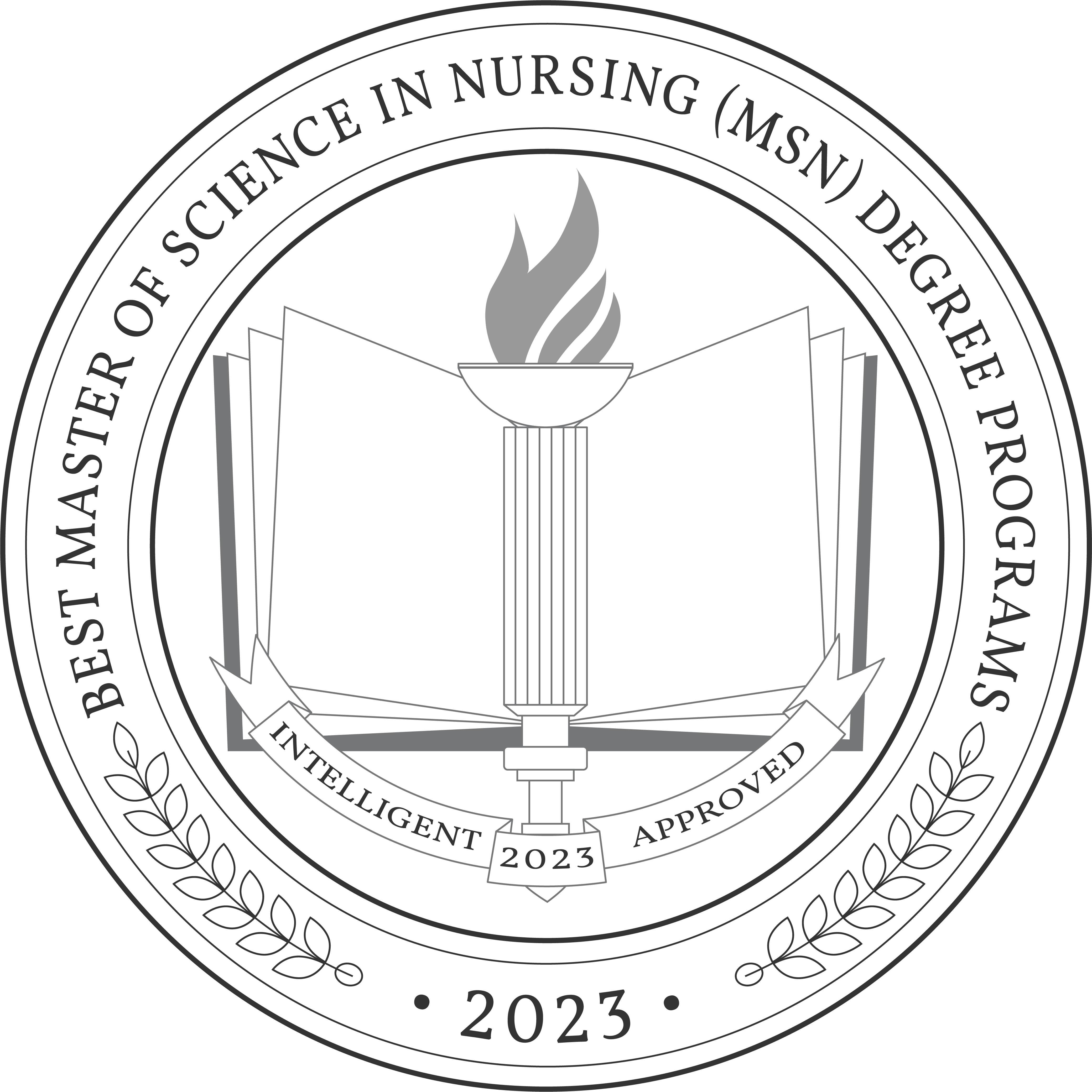Why This Matters
-
THE U.S. NEEDS 112,700 MORE NURSE PRACTITIONERS BY 2031
With a job growth rate of 46%, nurse practitioners are in higher demand than nearly every other profession. Hospitals, outpatient clinics, and physicians’ offices have the greatest need for graduate-level nurse practitioners.
-
MSN GRADUATES CREATE THEIR OWN CAREER PATH
Not all MSN graduates need to work in clinical settings. A master’s degree in nursing can also prepare you to become a nurse administrator, nurse educator, or nursing informatics specialist.
-
EXPECT A MEDIAN SALARY OF $123,780 WITH AN MSN DEGREE
Earn six figures with your MSN degree. The highest median income for MSN graduates belongs to nurse anesthetists, at nearly $200,000 a year, while nurse practitioners and nurse midwives enjoy a median income above $110,000.
Our Research
This list features some of the best master of science in nursing (MSN) programs at top colleges across the country. Each school featured is a nonprofit, accredited institution — either public or private — with a high standard of academic quality for post-secondary institutions. The programs on our list are accredited by agencies like the Commission on Collegiate Nursing Education (CCNE) and the Accreditation Commission for Education in Nursing (ACEN), both reputable organizations who assess nursing programs for educational excellence and a commitment to quality education.
We evaluated each school’s program on tuition costs, admission, retention and graduation rates, faculty, and reputation as well as the student resources provided for on-campus students. Then we calculated the Intelligent Score on a scale of 0 to 100. Read more about our ranking methodology.
Next, we compared this comprehensive list of master of science in nursing programs to a list of aggregated college rankings from reputable publications like the U.S. News & World Report among others to simplify a student’s college search. We pored through these rankings so students don’t have to.
The Top 50 Master of Science in Nursing (MSN) Degree Programs

Discover More Options
What You Should Know About This Degree
A master of science in nursing differs from its undergraduate counterpart in that it sharpens leadership skills and prepares students to enter administrative or educational roles. Graduate students focus on evidence-based practice, quality and safety measures, program evaluation, and health policy.
During your research, make note of the accrediting body for each program to ensure the accreditation is valid for your state of residence. This is important if your chosen career path involves becoming licensed as an APRN. It also helps ensure credits are transferable to a doctoral program in the future. Look for accreditations from CCNE, ACEN, COA, HLC, and a regional entity such as the Northwest Commission on Colleges and Universities (NWCCU) or North Central Association of Colleges and Secondary Schools (NCACSS).
Because the number of master’s-level nursing graduates will need to increase by nearly 50% through the end of the decade, choose a program that offers coursework in your specialty of interest. This will provide a competitive edge and differentiate your qualifications from those of other nursing graduates. Also, review programs to identify specialized learning tracks, such as organizational leadership or fast-track to RN programs for individuals who hold a non-nursing bachelor’s degree.
To designate yourself as an RN, you are required to complete the National Council Licensure Examination (NCLEX-RN) and follow all state-specific licensure requirements even if you don’t plan to become an APRN. If becoming an APRN is your goal, you should research your state’s licensing and nurse practitioner requirements, which might include a minimum number of clinical hours logged under the supervision of a medical doctor.
What’s Next?
As you research master of science in nursing programs, ask the following questions:
- Am I eligible for this program? To be eligible, you must have a bachelor’s degree, but not necessarily in nursing. Some colleges offer a fast-track program for those with a non-nursing bachelor’s degree seeking a career change. Prospective students interested in a fast-track RN program must complete nursing prerequisites prior to applying for admission.
- How long does it take to complete this online degree? Depending on the MSN program and your full-time status, most MSN degrees can be completed within two years. Unless otherwise noted, practical experience in a clinical setting must be completed in person even if your degree program offers courses online.
Before you decide on a degree program, note the application requirements, deadlines, and potential prerequisites for admission. Most graduate-level applications require a minimum undergraduate GPA and recent letters of recommendation from academic and professional sources.
In addition to completing the Free Application for Federal Student Aid (FAFSA), contact the financial aid office at each school to determine if scholarships, grants, or graduate assistantships are available to help you pay for school. Also, check with any professional organizations to which you belong to see if they offer annual awards for graduate school.
